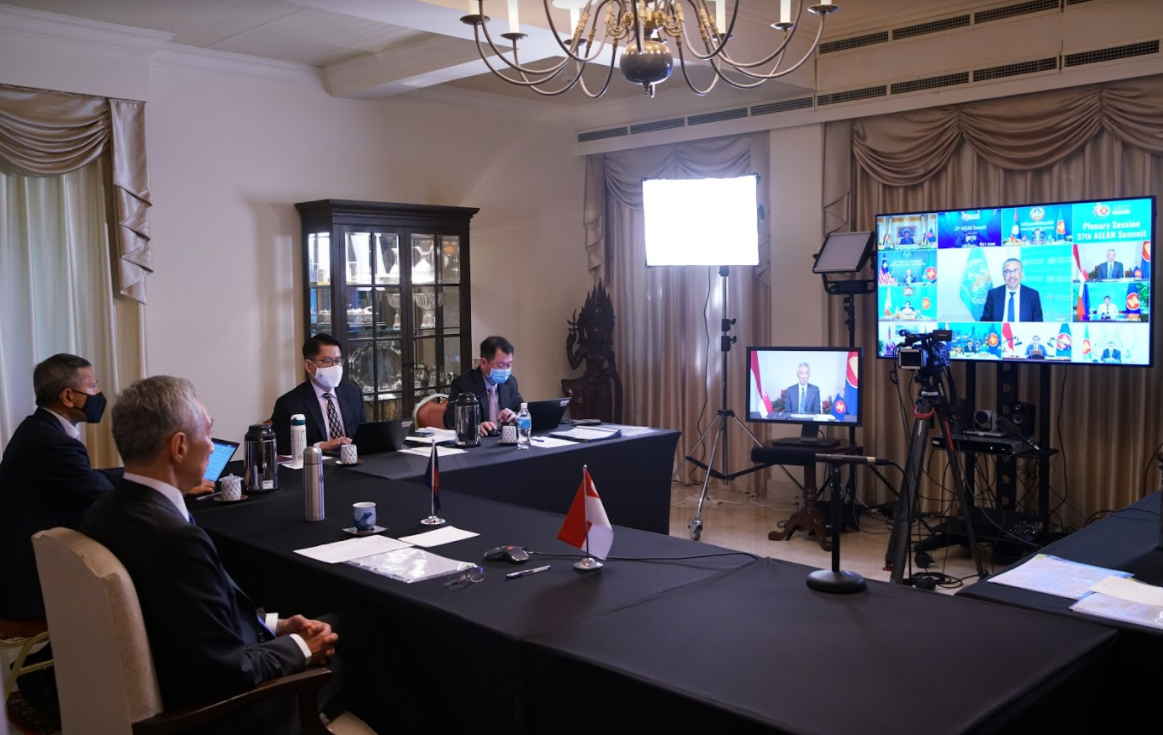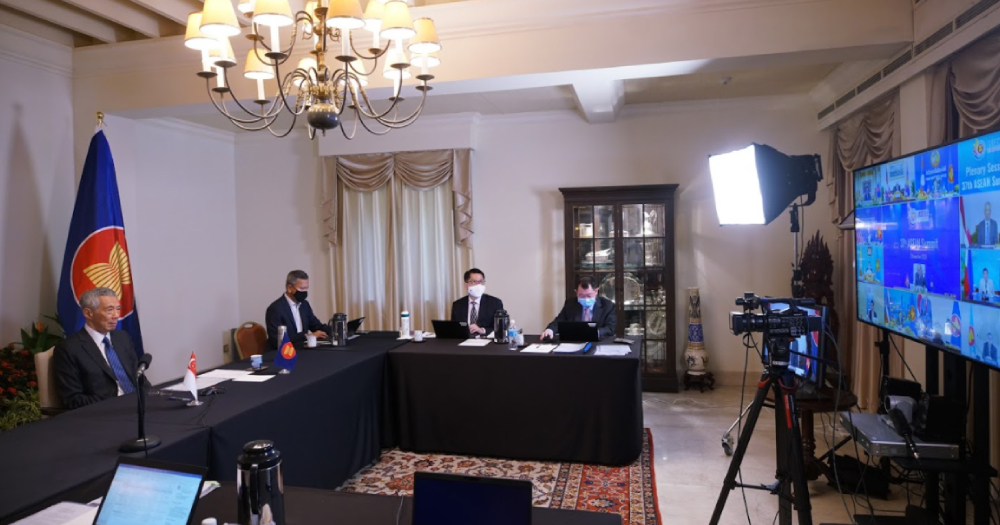Singapore will contribute US$100,000 (S$135,000) to aid in Asean's Covid-19 response, Prime Minister Lee Hsien Loong announced on Thursday morning, Nov. 12.
Asean should work together to soften impact of Covid-19
Speaking at the 37th Asean Summit -- held from Nov. 12 to 15 -- through video conference, PM Lee acknowledged that Covid-19 has been the defining challenge of 2020, and that Asean countries continue to grapple with new waves of infection and its economic impact.
 PM Lee attends the 37th ASEAN Summit and Related Summits on Nov. 12. (Image via Ministry of Communications and Information)
PM Lee attends the 37th ASEAN Summit and Related Summits on Nov. 12. (Image via Ministry of Communications and Information)
But the 10-member regional grouping, under Vietnam’s able stewardship, has played an important role in helping to make steady progress combatting the pandemic, he said.
He also noted that Asean member states also assisted one another to repatriate citizens stranded overseas.
The regional grouping had set up the Asean Coordinating Council Working Group on Public Health Emergencies to lead the regional response. This subsequently led to the creation of the Asean Regional Reserve of Medical Supplies and the Covid-19 ASEAN Response Fund, which Singapore has contributed to.
PM Lee stressed that Singapore recognises the importance of these mechanisms, adding that other initiatives like the Asean Comprehensive Recovery Framework, and the Strategic Framework on Public Health Emergencies, will strengthen Asean's readiness and enhance cooperation with external partners to fight future pandemics.
Asean should work together to mitigate the long-term impact of the pandemic on their economies and societies, he further added.
Asean should push for vaccine multilateralism
An immediate area to work on is ensuring the equitable, steady, and affordable supply of vaccines once they are available, PM Lee said, adding that Singapore firmly believes in “vaccine multilateralism”.
He said Singapore strongly supports global vaccine initiatives such as the Covid-19 Vaccine Global Access (COVAX) Facility, whose members include many Asean Member States and their external partners.
He added that Asean should work with them to facilitate the production and distribution of vaccines to meet the needs of the region.
RCEP signing reaffirms Asean's commitment to trade
As for the economy, PM Lee said Asean should redouble efforts to enhance its competitiveness in the post-Covid world, adding that there are existing frameworks they can build on, such as the Master Plan on Asean Connectivity 2025, Asean Smart Cities Network, and Asean Customs Transit System to facilitate the cross-border transit of goods.
These initiatives can catalyse the region's recovery, and let them make full use of technology as they adjust to new ways of living and doing business in the post-Covid world, PM Lee said.
PM Lee also said he is glad Asean has kept up efforts to strengthen their community.
Besides finding new ways to hold their meetings and events, they have made good progress on the Mid-Term Reviews of the Asean Community Blueprints, and have also begun developing the Asean Community’s post-2025 Vision.
PM Lee added that a major achievement is the signing of the Regional Comprehensive Economic Partnership (RCEP) later this Sunday.
The RCEP affirms Asean’s collective commitment to economic integration and an inclusive, open and rules-based multilateral trading system, he said.
Asean will continue to face challenges
PM Lee also cautioned that Asean will continue to face difficult challenges ahead, such as the one presented by great power rivalry.
Recent tensions between the U.S. and China have placed the region under greater stress and tested Asean Centrality and unity, he said.
But Asean can also make a modest contribution towards better mutual trust and cooperation among the major powers, he said, adding that regional architecture is open and inclusive by design, with Asean at its centre.
Therefore, Asean must retain their value proposition of offering a neutral platform for countries to work together on regional and global challenges such as counter-terrorism, cybersecurity and transboundary haze pollution, he added.
Asean leaders will further meet with their counterparts during the 23rd ASEAN Plus Three Summit, the 15th East Asia Summit, the 4th Regional Comprehensive Economic Partnership (RCEP) Summit.
They will also meet leaders from Australia, China, India, Japan, New Zealand, the Republic of Korea, the United Nations, and the U.S.
Totally unrelated but follow and listen to our podcast here
Top image via Ministry of Communications and Information
If you like what you read, follow us on Facebook, Instagram, Twitter and Telegram to get the latest updates.
